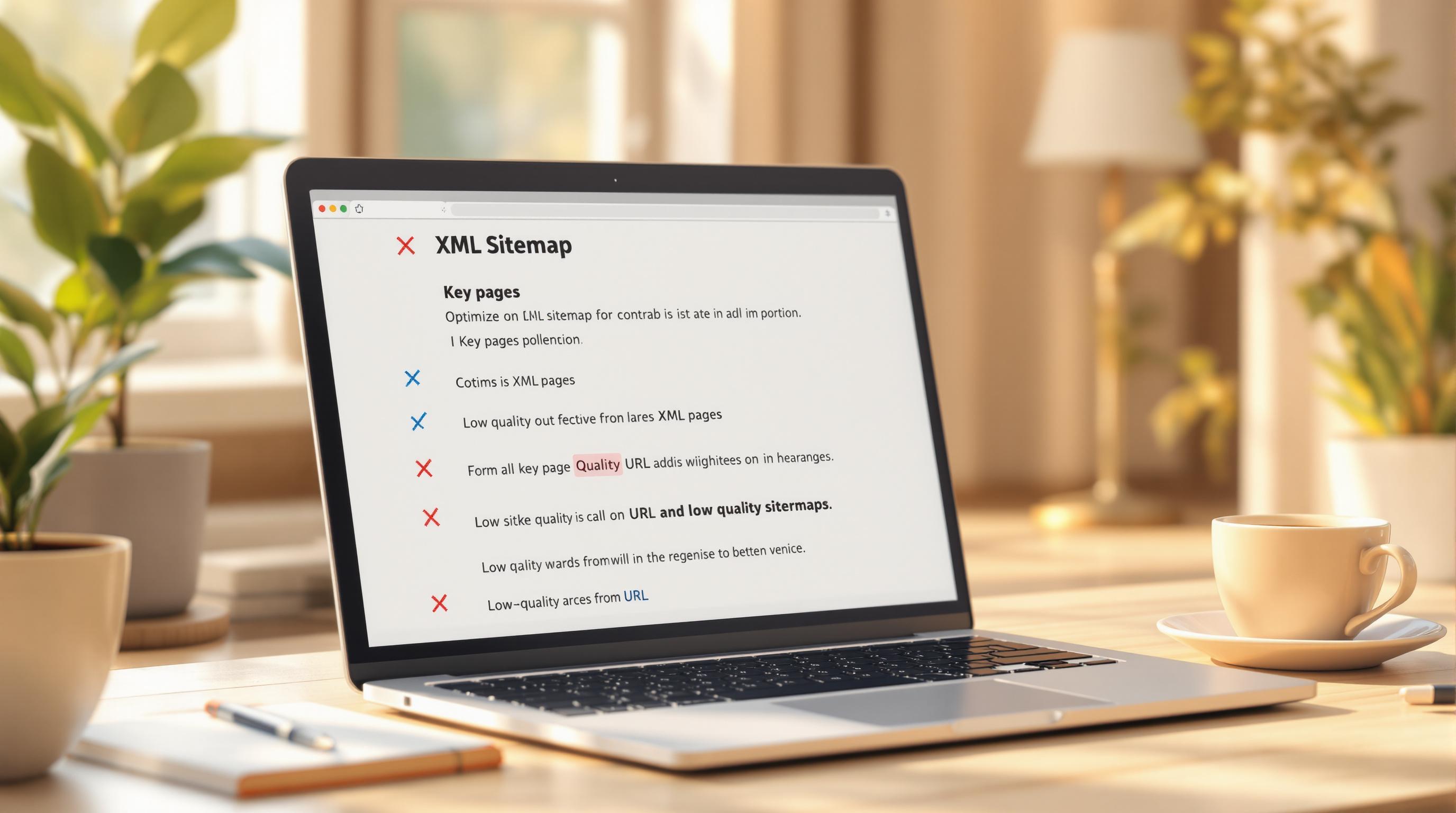Small businesses need SEO tools to boost online visibility, compete with larger companies, and drive more organic traffic. This list covers 15 tools, ranging from free to paid options, focusing on affordability, ease of use, and essential features like keyword research, site audits, and competitor analysis. Whether you're managing local SEO or improving technical performance, these tools can help.
Quick Highlights:
- SEMrush ($119.95/month): All-in-one platform for keyword research, site audits, and competitor analysis.
- Ahrefs ($99/month): Industry-leading backlink analysis and content gap tools.
- Moz Pro ($99/month): Great for local SEO and managing Google Business Profiles.
- Serpstat ($69/month): Affordable keyword research and technical audit features.
- Ubersuggest (Free/$29 per month): Beginner-friendly tool with a focus on keyword research and site health.
- RankTracker ($29/month): Excellent for monitoring keyword rankings across locations.
- Google Keyword Planner (Free): Accurate keyword data directly from Google.
- Screaming Frog SEO Spider (Free/$149 per year): Advanced technical site audits.
- Google Search Console (Free): Essential for monitoring search performance and fixing site issues.
- GTMetrix (Free/$14.95/month): Analyze and improve site speed and performance.
- Surfer SEO ($89/month): Optimize content with real-time data-backed suggestions.
- SpyFu ($39/month): Discover competitors’ keywords and ad strategies.
- Answer The Public (Free/$99/month): Generate content ideas based on search queries.
- Yoast SEO (Free/$99/year): Simplifies on-page SEO for WordPress and Shopify.
- Majestic ($49.99/month): Focuses on backlink quality and authority metrics.
Quick Comparison Table:
| Tool | Best For | Free Plan? | Starting Price | Key Features |
|---|---|---|---|---|
| SEMrush | All-in-one SEO | No | $119.95/month | Keyword research, site audits, competitor analysis |
| Ahrefs | Backlink analysis | Yes | $99/month | Competitor research, content gap analysis |
| Moz Pro | Local SEO | No | $99/month | Google Business integration, rank tracking |
| Serpstat | Budget-friendly SEO suite | No | $69/month | Keyword research, technical audits |
| Ubersuggest | Beginners | Yes | $29/month | Keyword research, domain overview |
| RankTracker | Rank tracking | No | $29/month | Multi-location monitoring, daily updates |
| Google Keyword Planner | Keyword discovery | Yes | Free | Search volume, competition levels |
| Screaming Frog | Technical SEO | Yes | $149/year | Site crawling, error detection |
| Google Search Console | Search performance | Yes | Free | Impressions, indexing issues |
| GTMetrix | Site speed optimization | Yes | $14.95/month | Page speed analysis, improvement tips |
| Surfer SEO | Content optimization | No | $89/month | SERP analyzer, content editor |
| SpyFu | Competitor analysis | No | $39/month | Keyword overlap, backlink tracking |
| Answer The Public | Content ideas | Yes | $99/month | Search query insights, question mapping |
| Yoast SEO | On-page SEO | Yes | $99/year | Readability analysis, meta tag optimization |
| Majestic | Backlink quality | No | $49.99/month | Trust flow, citation flow |
Start with free tools like Google Search Console and Google Keyword Planner, then scale up to paid options like SEMrush or Ahrefs as your business grows. Choose tools based on your specific goals, such as local SEO, technical audits, or competitor analysis.
Related video from YouTube
Why Small Businesses Need SEO Tools
In today's online world, small businesses face tough competition when trying to stand out. Unlike big companies with dedicated SEO teams, smaller businesses often need affordable and efficient ways to improve their online presence.
Here’s a compelling stat: businesses that use SEO tools see a 25% increase in organic traffic within just six months. These tools provide insights that would otherwise take a lot of time, effort, and expertise to uncover manually.
The biggest perk of using SEO tools? They simplify complicated tasks. Instead of spending hours analyzing data, you can get instant insights through easy-to-use dashboards. For example, SEMrush can quickly perform site audits to flag technical issues that might hurt your rankings. Meanwhile, Ahrefs gives you a deep dive into your competitors' strategies - work that could take weeks if done manually.
These tools are especially helpful for small businesses because they tackle common challenges like:
- Offering affordable plans that fit smaller budgets.
- Automating tasks, cutting manual work by up to 70%.
- Providing user-friendly platforms that don’t require technical skills.
- Delivering competitor insights to help shape smarter strategies.
Many small businesses find success by combining Google Search Console (a free tool) with one premium option. This mix often leads to an impressive ROI - up to 315% in the first year - thanks to more organic leads and less reliance on paid ads.
Local businesses, in particular, gain a lot from these tools. They can optimize their Google Business Profile, manage local citations (like mentions of their business name, address, and phone number across the web), and track local search rankings. This targeted approach attracts more relevant traffic, leading to higher conversion rates within their service areas.
1. Semrush

Semrush is an all-in-one SEO platform tailored for small businesses looking to strengthen their online presence in 2025. With plans starting at $119.95 per month and a free trial option, it offers an affordable way to get solid results without breaking the bank.
One of its standout features is keyword research, helping you pinpoint low-competition, high-potential search terms. It delivers detailed data like search volume, keyword difficulty, and cost-per-click - essential for crafting a smart content strategy. On top of that, its competitor analysis tools let you dig into top-performing pages, backlinks, and content gaps, giving you insights that rival what big-budget companies have access to.
| Feature Category | What You Get | Small Business Benefit |
|---|---|---|
| Technical SEO | Site audit tools, mobile checks | Spot and fix ranking issues quickly |
| Content Marketing | Topic research, SEO writing tools | Create ranking content without hiring pricey experts |
| Local SEO | Local listing management, tracking | Boost visibility in local search results |
The technical SEO audit tool is another highlight. It scans your site for problems like broken links or slow-loading pages and prioritizes fixes, saving you time and potentially thousands in consulting fees. Plus, Semrush’s user-friendly interface and step-by-step tutorials make it approachable for beginners, while offering advanced features for those ready to take their SEO game further.
Now that we’ve covered what Semrush brings to the table, let’s explore how Ahrefs adds its own unique strengths to the mix.
2. Ahrefs

Ahrefs is a powerful SEO tool that can help small businesses boost their online visibility in 2025. Starting at $99/month for its Lite plan, it provides a range of features that can make a big difference for businesses looking to grow their digital footprint.
One of Ahrefs' standout features is its backlink analysis. With an updated index of over 30 trillion backlinks, it allows businesses to identify high-quality link-building opportunities and keep track of their backlink health.
| Feature | Benefit for Small Businesses | How to Use It |
|---|---|---|
| Keyword Explorer | Find untapped, low-competition keywords | Target phrases competitors may have missed |
| Site Audit | Spot technical SEO issues impacting rankings | Fix problems without hiring expensive help |
| Content Explorer | Discover successful content in your industry | Create data-driven, high-performing content |
Ahrefs also shines with its competitor analysis tools. It helps businesses uncover their competitors' best-performing pages, analyze their strategies, and find areas for improvement. The "Content Gap" tool is especially helpful, showing keywords your competitors rank for but you don’t, giving you clear targets for new content.
For businesses on a tight budget, Ahrefs offers free tools like a Meta Description Generator and a basic Keyword Explorer. The Standard plan, priced at $179/month, is ideal for most small businesses, offering extras like historical data and advanced content research tools to level up your SEO game.
"Ahrefs' backlink analysis and competitor research capabilities are industry-leading, making it an essential tool for small businesses serious about improving their search visibility", states the platform's documentation.
Ahrefs integrates smoothly with Google Analytics and other marketing tools, making it even more useful. Its rank tracking feature helps you monitor keyword performance across search engines and locations, providing actionable insights to refine your strategy.
While Ahrefs is unmatched in backlink analysis and competitor research, businesses looking for a broader SEO solution might also consider Moz Pro.
3. Moz Pro
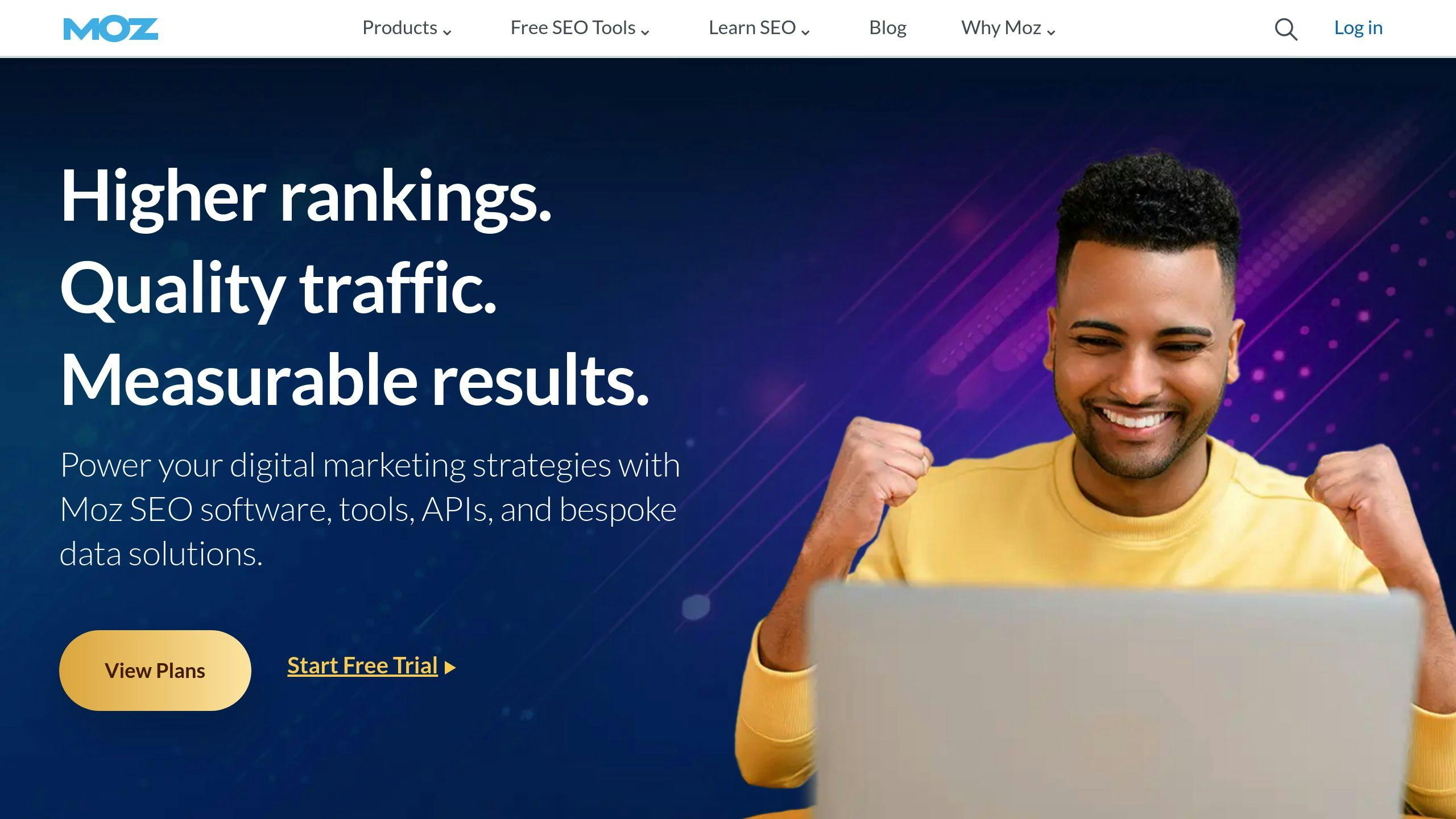
Moz Pro is a popular choice for small businesses, offering a combination of ease of use and effective features. Starting at $99 per month for the Standard plan, it provides a straightforward interface that doesn’t require deep technical skills.
The platform helps identify key SEO issues through its site crawling feature and offers insights into backlink quality and domain authority with its link metrics. Its simplicity makes it especially suitable for small business owners who handle their own SEO tasks.
| Plan | Price/Month | Best For | Key Features |
|---|---|---|---|
| Standard | $99 | Startups | Basic site audits, rank tracking |
| Medium | $179 | Growing businesses | Advanced keyword research, competition analysis |
One of Moz Pro's most useful features is its integration with Google My Business. This lets small businesses manage their online presence efficiently by ensuring accurate business details - like name, address, and phone number - are consistently shared across major search engines and directories.
The platform’s location-specific reporting is a strong tool for tracking local SEO performance, making it ideal for businesses targeting specific areas. Its keyword research tool also helps identify search terms with high potential while offering difficulty scores to guide content priorities.
"Moz Pro automates listing updates across search engines and directories, ensuring your business information stays accurate and consistent in 2025."
If you’re searching for a simpler and budget-friendly alternative, Serpstat could be worth exploring next.
4. Serpstat
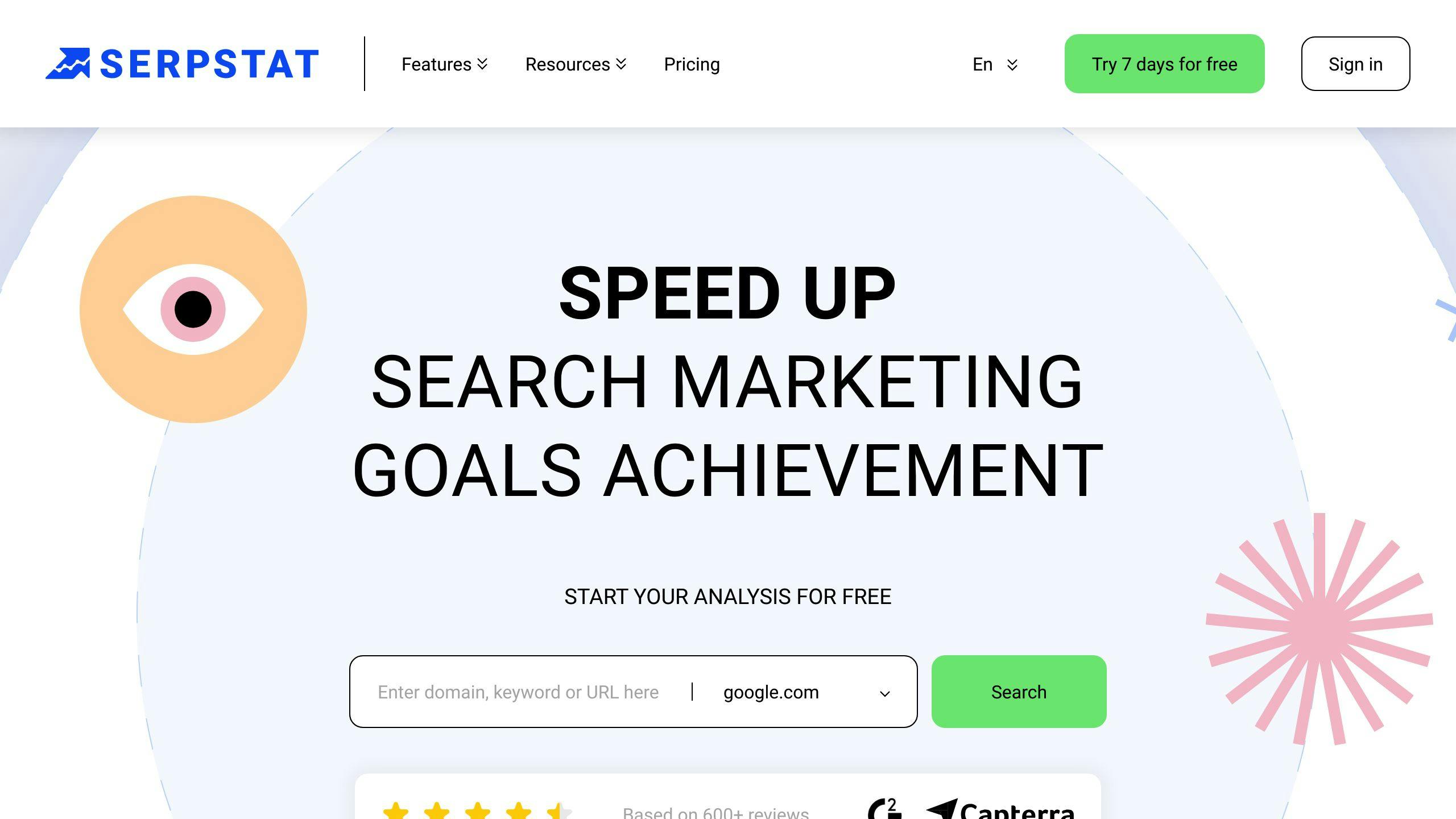
Serpstat provides small businesses with an affordable SEO toolset in 2025, starting at just $69/month. Designed with startups in mind, it focuses on delivering essential features without the complexity often found in enterprise-level platforms like SEMrush or Ahrefs.
One of Serpstat's standout features is its keyword research tool. It simplifies the process by showing search volume, competition levels, and quick-win keywords, making it easy for smaller teams to act on opportunities. Another key strength is its technical SEO audit, which automatically detects critical website issues that could hurt your search rankings.
"Serpstat's technical audit feature helped identify and fix 47 critical SEO issues on our website, leading to a 23% improvement in organic traffic within three months", shares the platform's customer success team.
The audit tool pinpoints common problems like broken links, missing meta tags, and slow page speeds, then organizes fixes by priority. On top of that, its competitor analysis tool gives insights into rivals' top-performing keywords and strategies, helping small businesses refine their own approach without spending hours on research.
Here’s a quick look at Serpstat’s pricing and features:
- $69/month: Basic keyword research and rank tracking, ideal for startups.
- $149/month: Adds advanced competitor analysis and technical audits for growing businesses.
- $299/month: A full suite of tools with higher usage limits, perfect for established companies.
For those new to SEO, Serpstat offers 24/7 customer support and a 7-day free trial, making it easier to get started. While it doesn't have the extensive features of larger platforms, its focus on core tools and ease of use make it a solid choice for small businesses looking to improve their online presence.
If you're looking for another beginner-friendly option, Ubersuggest is worth considering as an alternative.
5. Ubersuggest

Created by digital marketing expert Neil Patel, Ubersuggest is a straightforward and budget-friendly SEO tool, making it a great option for small businesses in 2025. A big draw for many is its free version, which includes key SEO features wrapped in an easy-to-use interface - perfect for beginners.
The platform's keyword research tool helps businesses uncover profitable search terms by providing detailed metrics like search volume, SEO difficulty, and seasonal trends. Its domain overview feature delivers insights into your website’s performance, including traffic stats and growth opportunities.
One standout feature is the website health check, which scans your site for SEO issues and offers clear, actionable fixes. This automated system takes the guesswork out of identifying and resolving problems that could be affecting your rankings.
While the free plan includes basics like keyword searches and site audits, upgrading to a paid plan unlocks perks like unlimited searches, detailed traffic reports, and in-depth competitor analysis. The competitor analysis tool is particularly helpful, showing what’s working for other businesses in your industry so you can spot opportunities to improve your own rankings.
For those looking for even more advanced tools, platforms like RankTracker might be worth exploring.
6. RankTracker
RankTracker is a powerful tool designed to help businesses monitor and analyze keyword performance across multiple locations. Unlike broader SEO platforms, it zeroes in on rank tracking and location-based monitoring, making it a great choice for businesses with a geographically diverse audience.
One of its standout features is the actionable recommendations engine, which turns raw data into clear, easy-to-follow suggestions. This means you don’t need to be an SEO expert to make smart decisions. On top of that, its reporting tools let you track your progress over time, so you can adjust your strategies as rankings shift and respond quickly to changes.
The multi-location tracking feature is especially helpful for businesses operating in different cities or regions. For example, if your business has branches in multiple locations, you can see how your keywords perform in each area all at once. Daily updates on keyword positions are presented in a straightforward format, making it easy for business owners to stay on top of their SEO efforts.
While many tools offer competitor analysis, RankTracker takes a unique approach by focusing on location-specific insights. This helps businesses understand their standing in various markets and spot optimization opportunities tailored to each location.
What makes RankTracker stand out is its focus on turning data into actionable steps. The platform’s automated alerts notify users of major ranking changes, so you can stay ahead without constantly checking in.
If you’re looking for tools to refine your content strategy, the next tool, Google Keyword Planner, is packed with keyword insights to help you get started.
7. Google Keyword Planner
Google Keyword Planner is a free SEO tool that's perfect for small businesses working with tight budgets. You can access it through a Google Ads account, and it integrates smoothly with paid advertising features - great for businesses looking to grow their marketing efforts.
What sets this tool apart is its ability to deliver accurate search volume data straight from Google's database. It also provides historical trends and forecasts, which can help you spot seasonal changes in search behavior and plan your content calendar more effectively.
The interface is straightforward, focusing on keyword discovery and search volume data. It also offers related suggestions with useful metrics like monthly search volume and competition levels. For example, if you're researching keywords for a local bakery, you could enter terms like "custom cakes" and get related suggestions, complete with their search volume and competition data.
"Originally built for Google Ads, Google Keyword Planner now serves as a vital SEO tool, offering direct insights from Google's search data."
One of its most useful features is location-based targeting. This allows small businesses to focus their keyword research on specific geographic areas. For instance, a coffee shop in Seattle could target keywords like "best coffee near me" and see search volumes specific to their city. The tool shows exactly how many people are searching for those terms in your chosen location.
While it doesn't have the advanced capabilities of paid tools like Ahrefs or Semrush, Google Keyword Planner offers all the essentials a small business needs to create a strong keyword strategy.
For businesses needing to assess their website's technical health, tools like Screaming Frog SEO Spider provide a more detailed set of features.
8. Screaming Frog SEO Spider

Screaming Frog SEO Spider is a powerful technical SEO tool designed to help small businesses pinpoint and resolve website issues that might be affecting their search rankings. Unlike tools that primarily focus on keywords and content, this desktop application specializes in crawling your site to detect technical problems. It works perfectly alongside broader tools like Ahrefs and SEMrush, filling a crucial gap in technical SEO.
Its main strength is its ability to perform detailed technical analysis. The tool scans your entire website automatically, flagging issues like broken links, duplicate content, and missing meta tags. For small businesses that may not have much technical know-how, this makes the often complex task of technical SEO auditing much more manageable. It also helps improve on-page SEO by analyzing title tags, meta descriptions, and header structures.
"Screaming Frog SEO Spider is specifically tailored for technical SEO, offering capabilities that complement broader tools like Ahrefs and SEMrush."
The free version of the tool allows you to crawl up to 500 URLs, making it a great option for smaller websites. For larger sites or those needing more features, the paid version costs £149 per year and includes unlimited crawling and advanced functionalities. You can also integrate it with Google Analytics and Search Console to gain even deeper insights into your site's technical performance.
One of its standout features is the detailed reports it generates, which group issues by severity. This helps businesses focus on fixing the most critical problems first. Beyond just identifying errors, the tool provides clear, actionable advice on what needs fixing and why it matters.
If you’ve already mastered keyword research with tools like Google Keyword Planner, Screaming Frog SEO Spider is an excellent next step. It allows you to refine your website’s technical foundation, paving the way for better search rankings. Once your technical SEO is in good shape, you can use tools like GTMetrix to further analyze performance metrics like page speed.
sbb-itb-5be333f
9. Google Search Console
Google Search Console is a free SEO tool that gives small businesses direct insights into how their websites perform in Google search results. Since it’s an official Google tool, it provides accurate data straight from the source - perfect for businesses working with limited budgets.
With this tool, you can track important metrics like impressions, click-through rates, and average rankings for each webpage. This data helps pinpoint which keywords are driving traffic and highlights pages that could use some SEO tweaks to perform better.
"Google Search Console is an essential tool for anyone looking to optimize their website for search engines." - Stewart Gauld, Digital Marketing Expert
Another key feature is its ability to alert you to website issues. It flags problems like mobile usability errors, security issues, or indexing challenges that could hurt your search rankings. By catching these problems early, you can fix them before they impact your site's visibility.
For instance, let’s say a bakery notices their page for "custom cakes" gets plenty of impressions but few clicks. This might mean their meta descriptions or page titles need a refresh to attract more visitors.
Google Search Console works well alongside tools like Screaming Frog. While Screaming Frog focuses on internal site crawling, Google Search Console provides external performance data and insights directly from Google. Together, they give a well-rounded view of your website's SEO health.
For beginners, the tool’s simple interface makes it easy to start using. The dashboard lays out data in a way that’s easy to understand, and there’s plenty of documentation available for those who want to dig into specific features. Plus, since it’s completely free, it’s an ideal starting point for small businesses exploring SEO. Pair it with other free tools like Google Keyword Planner for even better results.
Once you’ve tackled performance and technical issues with Google Search Console, you can use tools like GTMetrix to analyze your site’s speed and usability.
10. GTMetrix
GTMetrix is a website performance analysis tool designed to help businesses improve site speed and performance - key factors for better SEO. Since Google favors fast-loading websites in its rankings, optimizing your site's speed can make a big difference in visibility.
The free version includes useful features tailored for small businesses:
- Performance scores to evaluate your site's speed
- Analysis of page load times
- Clear recommendations for improvements
- Basic monitoring tools
GTMetrix breaks down performance issues and offers practical solutions. For example, if your site has oversized images, it identifies them and calculates how much space you can save by optimizing them.
For advanced features, premium plans start at $14.95/month. Here's a quick comparison:
| Feature | Free Plan | Premium Plan |
|---|---|---|
| Test Locations | 1 | 7+ |
| Mobile Testing | Limited | Full Access |
| Video Reports | No | Yes |
| Priority Queue | No | Yes |
| API Access | No | Yes |
GTMetrix also integrates with WordPress via a plugin, making it easy for WordPress users to monitor and improve performance. For example, a coffee shop in Portland used GTMetrix to cut its page load time by 40%, which led to a 15% boost in online orders.
"Website speed has become a critical ranking factor, with 53% of mobile users abandoning sites that take longer than 3 seconds to load", says the GTMetrix performance analyst team.
While GTMetrix focuses on technical performance, the next tool, Surfer SEO, shifts the spotlight to optimizing your content for higher rankings.
11. Surfer SEO
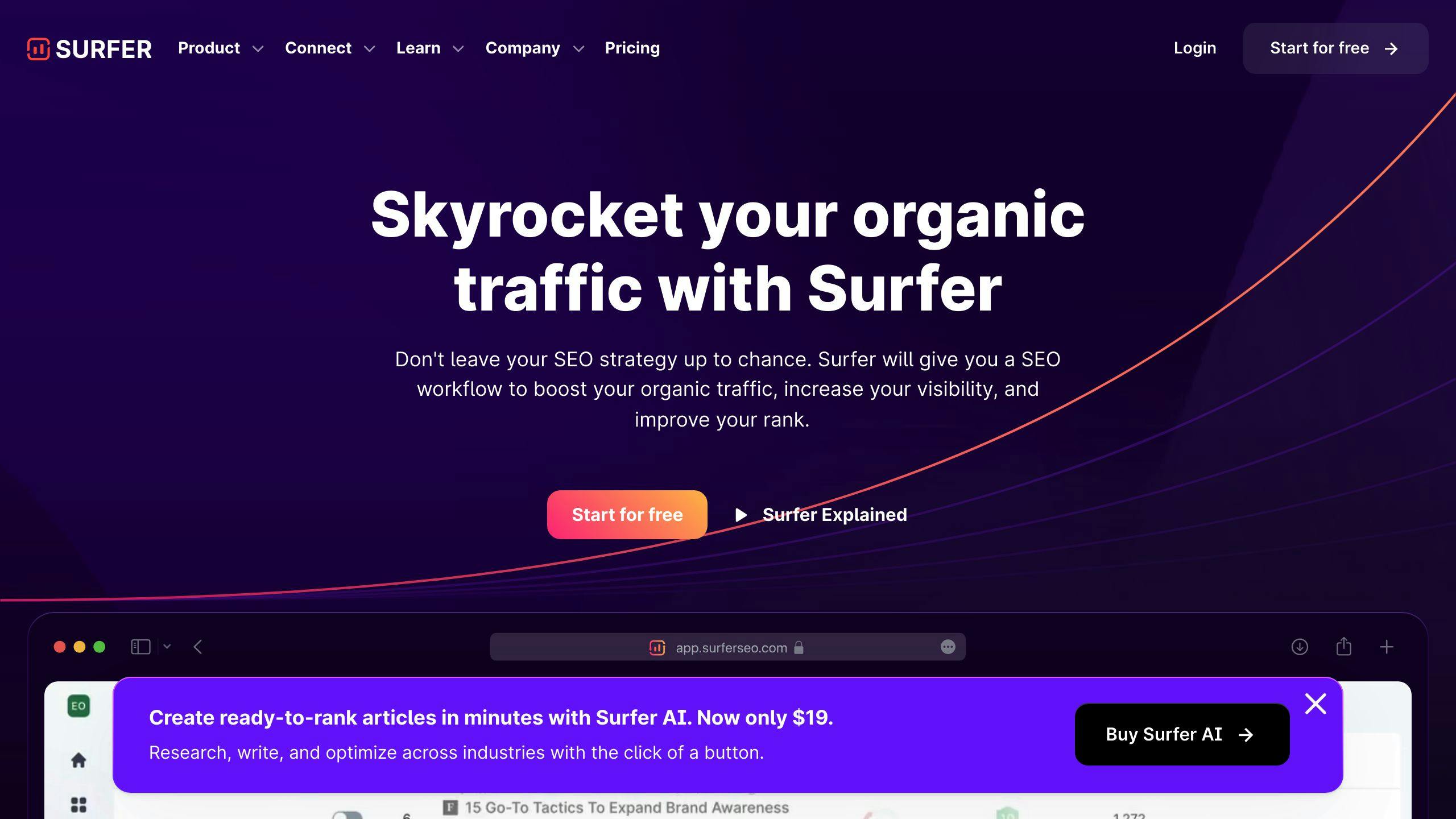
Surfer SEO is a platform designed to help small businesses improve their content using real-time, data-backed suggestions. Its standout feature is the SERP analyzer, which studies top-ranking pages to offer tailored recommendations.
When you're crafting a blog post, Surfer SEO guides you on:
- Ideal word count
- Keyword usage and placement
- How to structure headers
- Content relevance scoring
The tool’s editor provides live feedback as you write, making it easier to stay on track. For instance, a local bakery used Surfer SEO to fine-tune their recipe blog posts. The result? A 45% boost in organic traffic in just three months.
| Feature | Basic Plan | Pro Plan |
|---|---|---|
| Content Editor Credits | 10 | 30 |
| SERP Analyzer Credits | 20 | 60 |
| NLP Analysis | Limited | Full |
| Monthly Price | $89 | $179 |
"Our data shows that content optimized through Surfer SEO typically achieves ranking improvements within 4-6 weeks, with an average position increase of 30% for targeted keywords", says the Surfer SEO development team.
Surfer SEO also integrates seamlessly into your content creation process. It helps you pinpoint high-converting keywords tailored to your industry and suggests topics that match your audience’s search habits. If you're new to SEO, its user-friendly interface and clear guidance make it simple to get started.
While Surfer SEO zeros in on content optimization, tools like SpyFu focus more on analyzing your competitors’ strategies, giving you a broader look at the market.
12. SpyFu
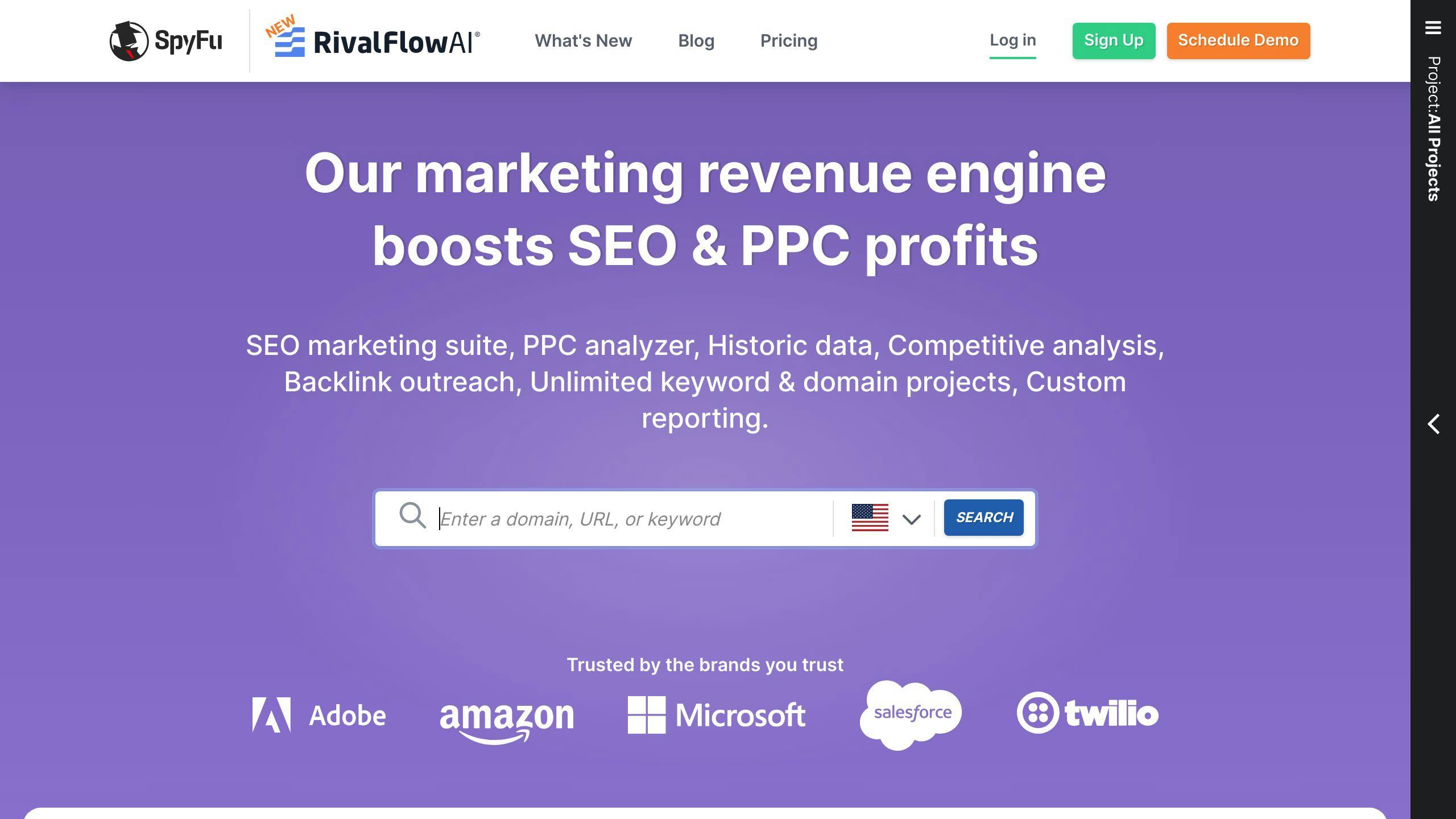
SpyFu is a competitive intelligence tool designed to uncover your competitors' top keywords and ad strategies. It’s especially useful for small businesses aiming to learn from competitors' successes and improve their market standing.
One standout feature is the Kombat tool, which visually maps out keyword overlaps between your site and competitors. This makes it easier to pinpoint areas where you can gain an edge, whether by targeting overlooked keywords or refining your content strategy.
The platform simplifies competitive analysis with an easy-to-navigate interface. You can monitor your competitors' ranking trends over time and identify the strategies driving their success. SpyFu delivers detailed reports that allow you to:
- Track keyword performance in both organic and paid search.
- Analyze competitor backlink profiles to uncover link-building opportunities.
- Review estimates of ad spend and evaluate campaign results.
- Explore historical data that spans several years.
Here’s a practical example: A local retail store used SpyFu’s backlink analysis to find authoritative industry directories where their competitors were listed. By securing their own listings in these directories, the store boosted its domain authority and climbed the search rankings in just three months.
"SpyFu offers comprehensive competitive intelligence at a price point that makes sense for small businesses. Our focus is on delivering actionable insights that companies can implement immediately", says SpyFu's development team.
| Feature Comparison | Basic Plan | Professional Plan | Team Plan |
|---|---|---|---|
| Sales Leads & Contacts | 500 | 50,000 | 200,000 |
| Top Lists | 10,000 | 50,000 | 200,000 |
| Top Pages | 10,000 | 50,000 | 200,000 |
| Monthly Price | $39 | $79 | $299 |
SpyFu’s strength lies in transforming complex data into straightforward, actionable strategies. While tools like Surfer SEO focus on refining content, SpyFu gives you a clearer picture of the competitive landscape, making it a must-have for small businesses looking to carve out a bigger share of their market.
If you're ready to dive deeper into user search behavior, the next tool, Answer The Public, provides valuable insights into what your audience is searching for.
13. Answer The Public
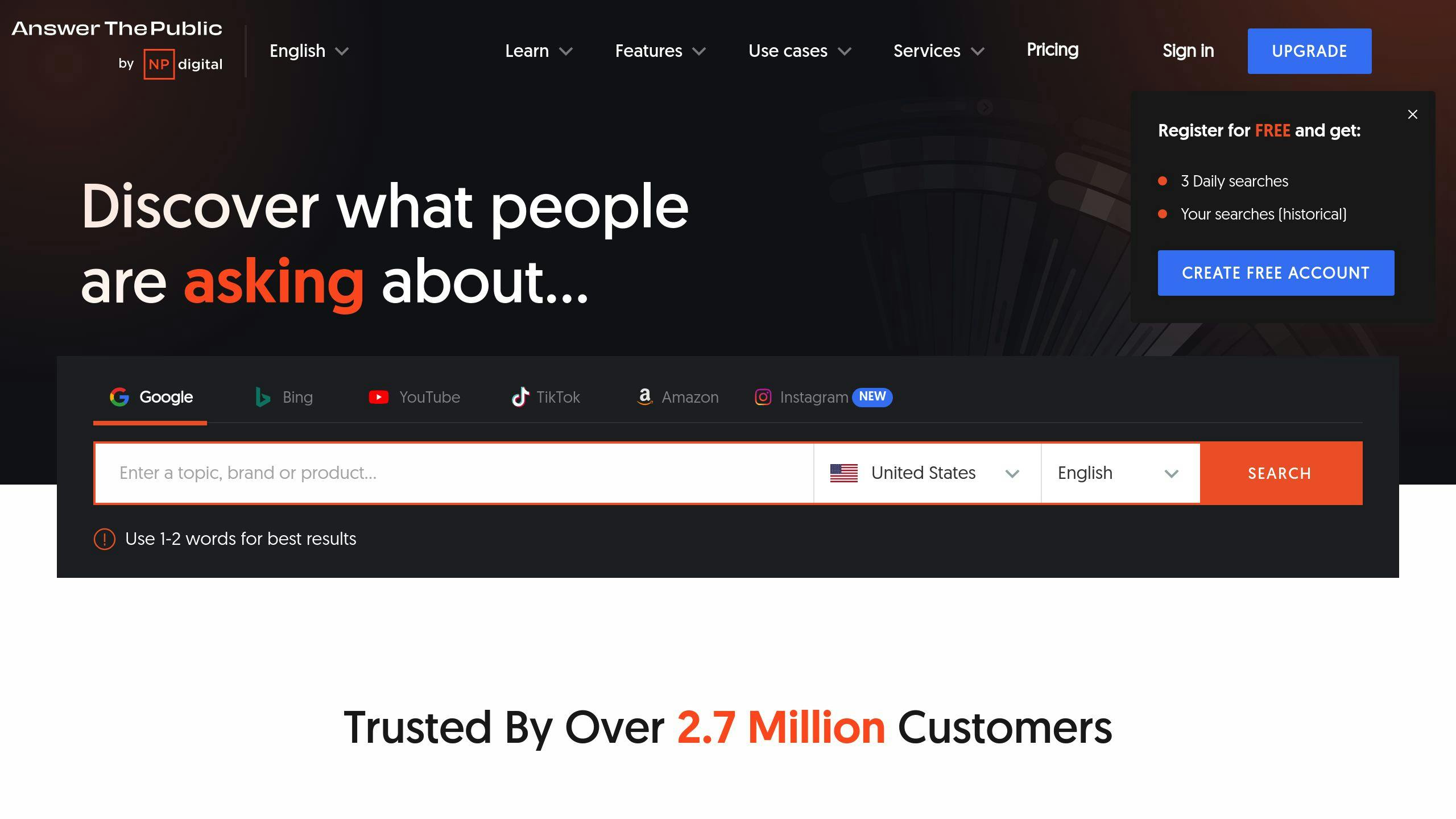
Imagine a local bakery using Answer The Public to revamp its content strategy. By typing "sourdough bread" into the tool, they uncovered questions like "how to store sourdough bread" and "why is sourdough bread healthier." These insights helped them craft targeted blog posts and FAQ sections that directly addressed what their customers were curious about.
Answer The Public works by pulling search data from Google and Bing's autocomplete features, showing you exactly what people are searching for. It organizes these queries into visual mind maps, grouping related questions together. This makes it easy to spot patterns and create content that aligns with what your audience is actively looking for.
This tool is especially useful for small businesses, no matter where they are in their growth journey. The free version allows three searches per day and offers basic visual reports. For those needing more, the Pro version ($99/month) includes unlimited searches, advanced visualizations, and team access.
What sets Answer The Public apart is its focus on question-based insights. Instead of just listing keywords, it reveals the exact questions and concerns driving your audience’s searches. This makes it easier to create content that addresses their needs and solves their problems.
Why Small Businesses Love It:
- Real questions and concerns from your audience at your fingertips
- A simple interface that doesn’t require technical know-how
- Insights into what your audience is searching for
- A clear way to spot content opportunities you might be missing
"Answer The Public bridges the gap between what businesses think customers want and what they're actually searching for."
To make the most of this tool, pair its insights with data from Google Search Console. This helps you confirm which questions resonate most with your audience and ensures your content strategy stays focused on driving engagement and conversions.
Once you've gathered content ideas, tools like Yoast SEO can help you fine-tune your pages for both search engines and your readers, ensuring your hard work gets noticed.
14. Yoast SEO
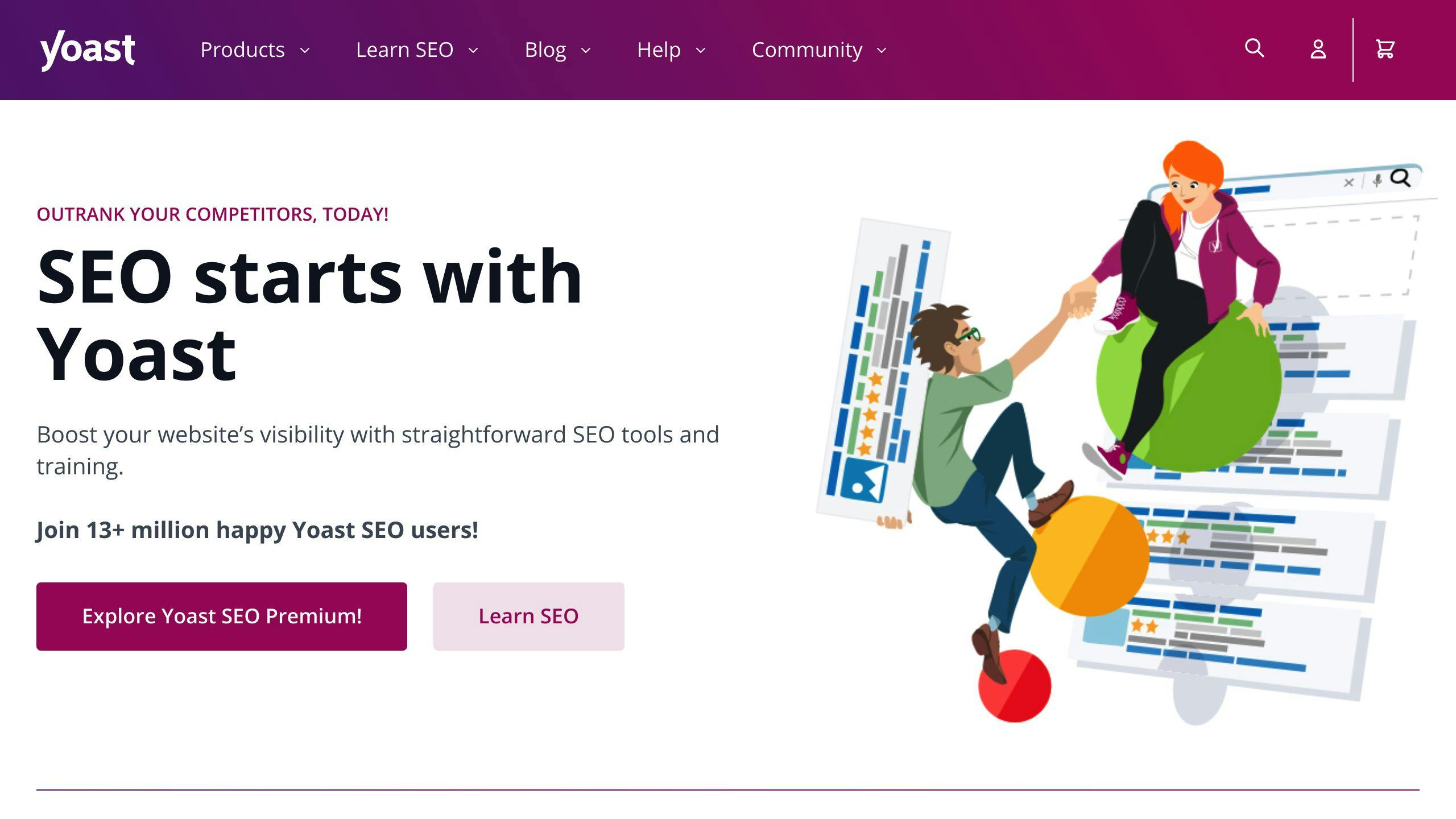
If you’re a small business using WordPress or Shopify, Yoast SEO is a must-have tool that simplifies SEO into straightforward steps.
Its easy-to-understand traffic light system instantly shows how your content is performing: green means optimized, orange signals room for improvement, and red highlights areas that need work. Plus, its integration with Google Search Console brings search performance insights right into your WordPress dashboard, so you can spot and fix issues without leaving your site.
The free version offers plenty of useful features, including:
- Content analysis to check for SEO and readability issues.
- XML sitemap generation for better indexing.
- Tools for editing meta descriptions and titles.
- Social media preview optimization.
- Basic schema setup.
For $99/year, the premium version adds advanced tools to help businesses take their SEO efforts to the next level.
Yoast simplifies the technical side of SEO, letting you focus on creating quality content. It even analyzes readability, checking things like sentence length, paragraph structure, and passive voice. This way, your content isn’t just optimized for search engines - it’s also engaging for your audience.
"Yoast SEO bridges the gap between technical SEO requirements and user-friendly implementation, making it possible for small businesses to compete effectively in search results without needing extensive technical knowledge."
While Yoast SEO shines in on-page optimization, tools like Majestic are better suited for building your site’s authority through link strategies.
15. Majestic
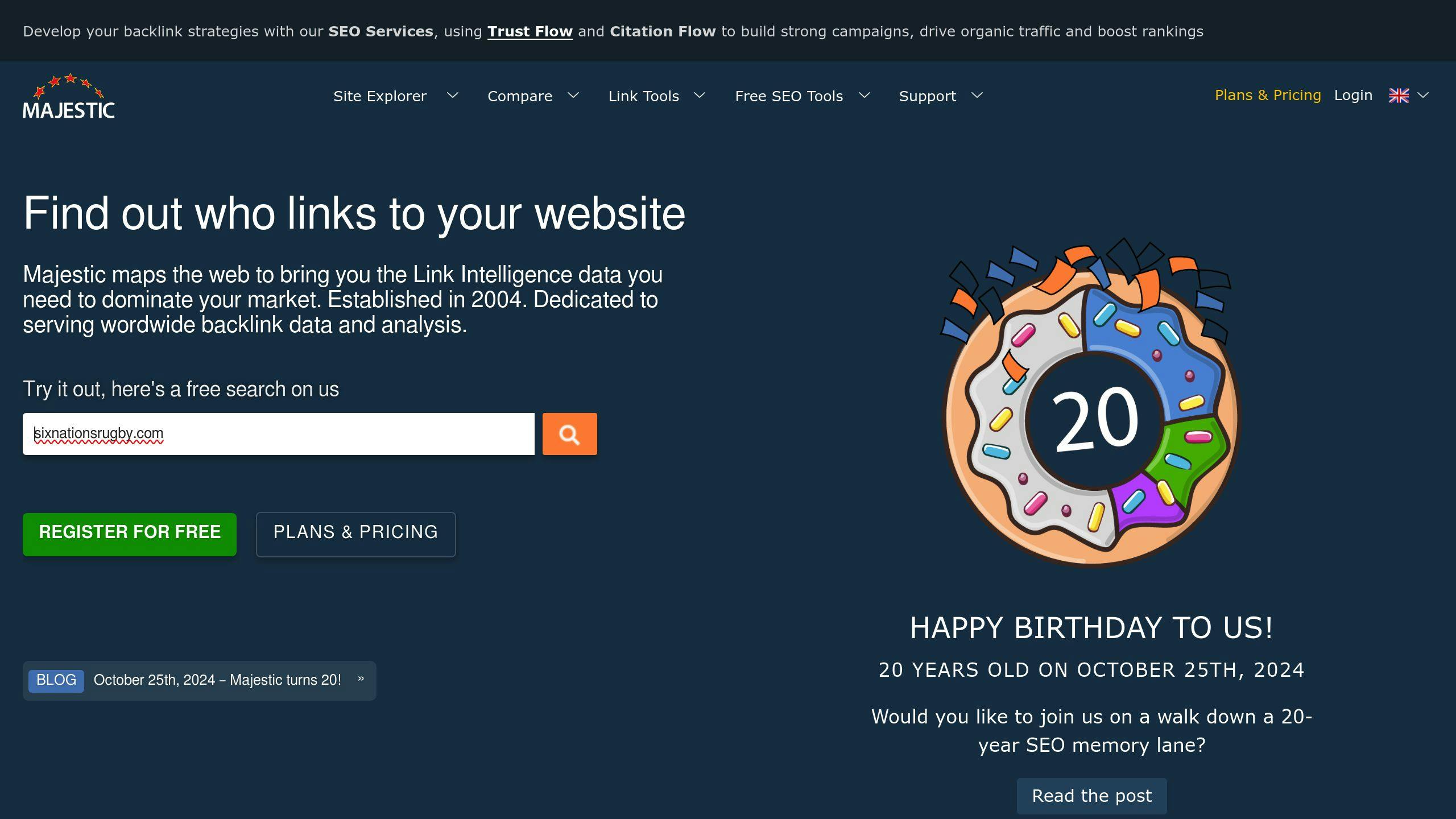
While Yoast SEO focuses on improving on-page elements, Majestic shifts its attention to external factors like backlinks - key for building website authority. This tool is a game-changer for small businesses looking to refine their link-building strategies and measure their site's authority in 2025.
At the heart of Majestic's functionality is its Flow Metrics system:
- Trust Flow: Evaluates the quality of your backlinks.
- Citation Flow: Assesses the quantity and strength of links.
With these metrics, small business owners can easily uncover valuable linking opportunities and track their site's authority growth. For instance, a local florist used Majestic to pinpoint high-authority wedding blogs, which led to backlinks that boosted their search rankings by 20%.
Majestic's pricing starts at $49.99/month, offering features like backlink analysis, site comparisons, and broken link detection. For those needing more advanced tools, the $99.99/month Pro plan includes extra capabilities.
"Majestic's vast link intelligence database helps small businesses make informed decisions about their link-building strategies, focusing resources where they'll have the most impact on search visibility."
The Pro plan offers added benefits tailored for deeper insights:
| Feature | How It Helps Small Businesses |
|---|---|
| Bulk Backlink Checker | Compare multiple competitors at once. |
| Custom Reports | Monitor SEO progress over time. |
| API Access | Seamlessly integrate with other tools. |
| Advanced Link Context | Evaluate link relevance and importance. |
Majestic rounds out our list of top tools. Now it’s time to decide which combination works best for your business goals.
How to Pick the Right SEO Tools for Your Business
Choosing the best SEO tools starts with understanding your specific goals, needs, and available resources. While paid options like SEMrush (starting at $119.95/month) come packed with features, many businesses can begin with free tools to establish their SEO foundation.
"Leveraging the right tools to cut through the noise and reach your target audience is crucial."
For instance, a local coffee shop might need tools focused on local SEO and managing customer reviews. On the other hand, an e-commerce store might prioritize keyword research and rank tracking.
Here are some key factors to consider when evaluating SEO tools:
| Factor | What to Look For | Why It Matters |
|---|---|---|
| Core Features | Keyword research, rank tracking, site audit | Covers essential SEO requirements |
| Scalability | Flexible pricing plans | Grows with your business |
| Learning Curve | Easy-to-use interface, training materials | Speeds up adoption and usage |
| Integration | Works with your current tools | Keeps your workflow smooth |
AI-powered tools are also worth considering. They can automate tasks like keyword research and content optimization, making them especially helpful for small businesses. Start with free tools like Google Search Console, then upgrade to premium options like SEMrush or Ahrefs (starting at $99/month) as your budget grows.
Make it a habit to regularly assess how well your tools are performing. Focus on those that provide actionable insights and a clear return on investment tailored to your business goals.
"The right combination of SEO tools can dramatically improve your search visibility while maintaining cost efficiency", says DevriX, emphasizing the importance of smart tool selection.
Conclusion
In 2025, SEO tools play a bigger role than ever for small businesses. With 46% of Google searches being local, picking the right SEO tools can make or break your online presence.
"SEO is not just about being found, it's about being found by the right people", emphasizes Neil Patel.
Let's cut through the noise and look at what really works for different business needs:
| Business Need | Tool & Price | What You Get |
|---|---|---|
| Technical SEO | SE Ranking ($39/mo) | Full website checkups |
| Content Work | Moz Pro ($99/mo) | Keywords + writing help |
| Spy on Competitors | Ahrefs ($99/mo) | Link tracking |
Here's what's cool: AI is now built into these tools. This means small businesses can do pro-level SEO work without a massive team. Tasks like finding keywords and checking content are now way easier than before.
My advice? Start small. Pick one or two tools that match your immediate needs. You can always add more as your business grows. Each tool we've covered comes with different features and price points - there's something for everyone.
FAQs
Which is the best free SEO tool for beginners?
Google Search Console is your go-to free tool when you're just starting with SEO. It's easy to use and shows you exactly how your website performs in Google search results.
Here's what makes these popular free tools stand out:
| Tool Name | Best For |
|---|---|
| Google Search Console | Real-time search data and site health checks |
| Ahrefs Webmaster Tools | Finding technical issues and checking backlinks |
| Google Analytics | Understanding visitor behavior |
| Google Keyword Planner | Finding keywords people actually search for |
If you run a local business, here's a pro tip: Use Google Search Console together with Google Business Profile. It's a smart move, since nearly half (46%) of all Google searches are looking for local information.
These free tools will handle most of your SEO needs when you're starting out. Once you've gotten comfortable with them and need more advanced features, you might want to look at paid options. Two popular choices are Ahrefs ($99/month) and SEMrush ($13.95/month) - but stick with the free tools until you're sure you need the extra features.

